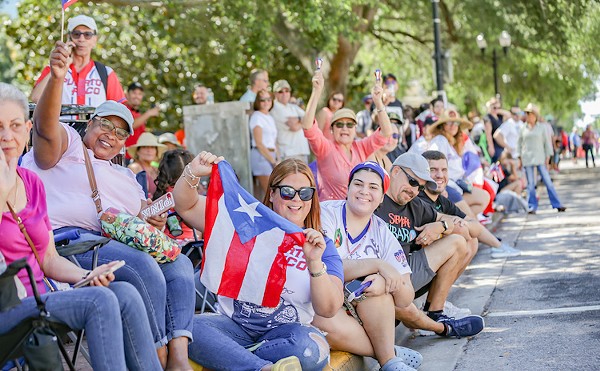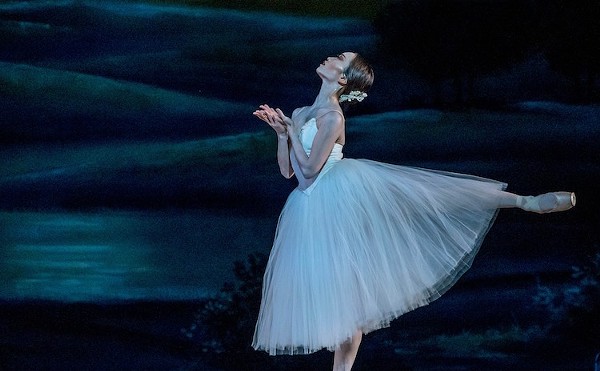ORLANDO INTERNATIONAL FRINGE THEATRE FESTIVAL
May 14-27 | orlandofringe.org
Today through Memorial Day, the 23rd annual Orlando International Fringe Theatre Festival once again pitches its tent in Loch Haven Park, and after all these years there should no need for us explain why local arts lovers flock to Fringe like villagers of old to the county fair. (But just in case it’s totally new to you: Orlando’s Fringe Festival is the longest-running unjuried theater festival in the U.S., presenting more than 100 shows along with Kids Fringe and Visual Fringe; 100 percent of box office proceeds go to artists.)
And just like the carnival of yore, more than one aspiring performer has been inspired to run away and join the circus – or the Fringe Festival circuit, as the summer-long series of similar events around North America and abroad is known. But what is life on the road really like for the touring thespians who Fringe full-time for months at a time? Is being a latter-day theatrical troubadour, riding the rails across a continent in search of sympathetic audiences, actually as romantic as it sounds, or is it more like being one of Barnum’s performing pachyderms?
No one understands the stresses and satisfactions of living on the Fringe better than T.J. Dawe. The writer-performer of hit monologues like The Slipknot, Totem Figures, Lucky 9, Medicine and this year’s Marathon has performed in 95 Fringes since first touring in 1994, making him one of the most enduring veterans currently on the Festival circuit. In 2014, he marks his 11th Orlando Fringe since 2001, and he says he’s seen the touring scene transform during his career.
“There’s a growing culture of people creating original theater,” says Dawe. “Fringe festivals are a natural place to put up new work, especially if you’re not backed by major resources. It’s the most cost-efficient way to self-produce, and there’s an audience that’s actually eager for something new.”
In fact, you could almost consider Dawe to be a victim of the success Fringe veterans like him helped create: “As this culture of self-creation grows, so does the competition to get into individual festivals. I used to tour eight or nine festivals in a summer. This summer I’m doing three.”
The competition Dawe refers to arises from the growing cadre of journeymen joining the Fringe caravan, and Orlando is developing a reputation as a launchpad for festival careers. Three performers who have successfully used Orlando as a springboard to Fringe circuit success are Martin Dockery, Paul Strickland and Chase Padgett. Each experienced his first taste of Fringe triumph in Orlando, and each has gone on to conquer other festivals across America and beyond, while still making certain to return to Central Florida each May.
The 2009 Orlando festival was the first Fringe Dockery (Wanderlust, The Bike Trip, The Dark Fantastic) ever performed in. “I had no idea how fun and artistically rewarding it would be. And it was absolutely wonderful to have people come and appreciate the show I was doing on its own terms,” recalls Dockery, who is now performing The Surprise, an autobiographical monologue about his secret half-siblings. “Myron Blattner [the late Fringe superfan] came to my first show and became a sort of cheerleader for it. That was the first time someone outside my circle had done so.”
Padgett, whose Orlando-birthed 6 Guitars has become “one of the most successful solo shows in the history of the Fringe circuit,” is returning home with an all-new version of his 2012 show, Nashville Hurricane. He credits Dawe, former Orlando Fringe producer Beth Marshall, and his mom, who signed him up for the Edinburgh fringe festival during a family vacation in the U.K., with encouraging his initial efforts.
Stand-up comic turned guitar-strumming soliloquist Strickland is back with Papa Squat’s Store of Sorts, a sequel to last year’s Ain’t True and Uncle False. Strickland “had no idea what the hell a Fringe was” when he attended Indianapolis’ in 2009 as an audience member; he came away thinking, “I cannot be as bad as some of them.” Since 2010, he’s played Fringes in Edmonton, Canada; Indianapolis, Atlanta, Cincinnati and Minneapolis.
Like all itinerant entertainers, Fringe artists fall into a certain routine on the circuit. “Summer is marked in two-week time increments,” explains Padgett. “Every two weeks there’s another festival, so the whole pattern starts over again. … Opening weekend is usually like a fun burst of energy.”
“I’m a bit of a worrier when it comes to scheduling,” says Strickland, explaining that sticking to a structure is important: “Every day when I get up, the first thing is I figure out what shows are on the schedule and what lines I’m going to work.” Even with a plan, the cycle can be draining. “It’s weird to sleep in a different bed every two weeks,” says Padgett. “You’re never at home. … Just at that point where you would feel comfortable, you have to go to a different city.”
It’s sometimes challenging for friends and family to truly understand the Fringe life. “My parents would have chosen something else” for his career, Strickland says wryly, adding he feels a “sense of ‘what the hell is this thing that you’re doing,’ but that’s not new for me.” However, most are generally supportive, Padgett has found: “Not all of them really understand what a Fringe is [and they] don’t fully understand what it means to travel and tour, [but] I’ve never had anyone that I really loved or cared about look down on me for doing it.”
The Fringe touring experience can be tough on personal relationships with non-Fringers, however. “I had sort of the best and worst experience at once,” Dockery recalls, in 2009: “Connecting with audiences as never before on stage, and then fighting with a girlfriend who wanted nothing to do with my show off stage. Needless to say, she and I are no longer together, while the Fringe and I are still in the midst of a wonderful relationship.” Padgett concurs, offering, “It’s really hard to maintain any sort of real romantic relationship if you are on the road in a different country for four or five months straight.” Dockery overcame the issue by encountering his current girlfriend on the Fringe circuit in London, Ontario, in 2010. “Having someone to share the road with gives me a foundation that I can lean on when living out of a backpack for half the year.”
Romance aside, fellow Fringe performers “become family in a very, very special way,” according to Padgett. “Everyone is riding a similar wave of experiences. … In the trenches, fighting the good fight, everyone is unified by such a unique experience. You form really special bonds and friendships.” Strickland agrees, saying “a huge part of the Fringe for me is just the sense of community that I sometimes find in stand-up, but quite frankly not nearly as often as I do at a Fringe.”
But that camaraderie can have dangers, Dockery warns: “As great as festivals are, they can be a bit disorienting, especially as they come one after the other, back to back for months on end. Each festival is that particular city’s big party, and so you’re always at a big party. Luckily, I’m very social and love big parties, but goodness, it’s quite something to be at what can feel like one long party for six months a year, every single year.” Padgett coaches those tackling the tour that “doing this two-week cycle for four months straight – eating on the road, traveling – can really take a toll on your body. You have to make a concerted effort to take care of yourself, to have downtime and eat healthy food, and – god help me – go to a gym. If you don’t, by the time you get to Vancouver in September, the end of the circuit, you’re toast.”
Though they offer some constructive nitpicks (Padgett wishes the outdoor stage was “a more legitimate Fringe venue, rather than just something people walk by on their way to fried PB&Js”), these artists repeatedly return to Orlando with praise for our participants and patrons. “Orlando Fringe is a gem. It really is,” asserts Padgett. “A lot of the touring guys who did not start in that town go back to it, because it’s a good place to be.”
One thing all these veterans would appreciate is more support for artists less established than themselves. “I would encourage the audiences in Orlando to see more shows by artists they’ve never heard of,” Dockery recommends. “If someone’s taken the trouble to bring a piece of theater from a thousand miles away, they’ve got to be on to something. Or they’re crazy, but that could be a wild experience, too.”
Strickland shares similar sentiments, saying, “I’ve seen lots of bad shows, but I’ve never been disappointed by my willingness to take a risk at a festival. Because there’s always one show that you throw your hands up in the air and say ‘I have no idea what I’m going to see,’ and often it’s one of the top five shows of the Fringe.”
Padgett speaks for many Fringe performers when he says, “There are a lot of people who have dreams of pursuing their passions, and they don’t for various reasons. The Fringe Festival circuit really offers a chance for people who have something in their heart that may be a little off the beaten path, to go and do it … and even make a living at it. No matter what happens I get to stand in front of audiences and do the show that I care most about for a professional living.
“The best thing about it all is focusing on a sense of gratitude, never losing sight of the fact that I get to do this.”















